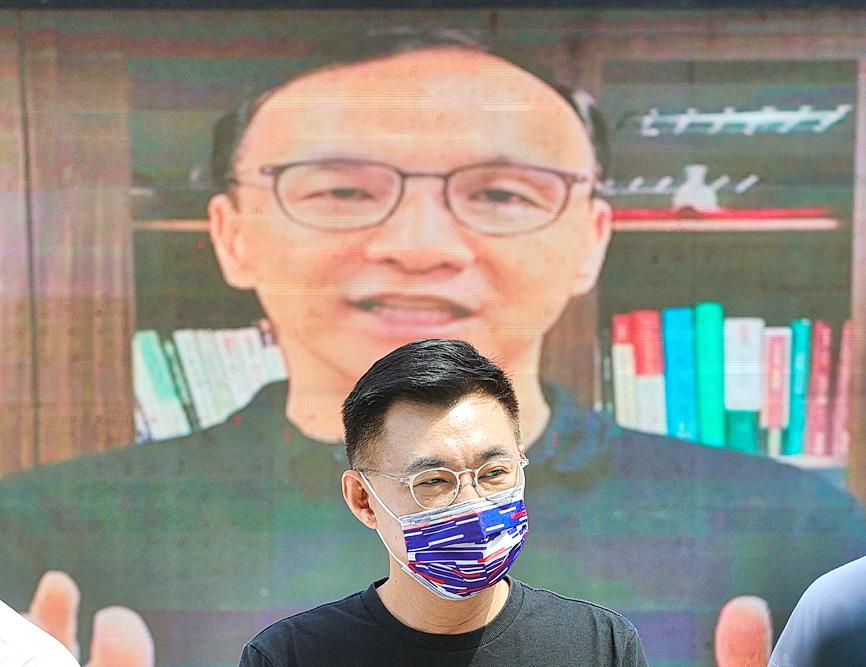Chinese Nationalist Party (KMT) Chairman Johnny Chiang (江啟臣) yesterday called for relations with China to be returned to a state of “no unification, no independence and no use of force,” and proposed the establishment of a committee on the development of peace across the Taiwan Strait.
Chiang made the remarks at the KMT’s weekly Central Standing Committee meeting in Taipei — the final one over which he would preside before taking a leave of absence next week to campaign for re-election as KMT chairman.
He began his address by thanking the nation’s delegation for its success at the Tokyo Olympic Games, which closed on Sunday, adding that the KMT would stand with the athletes and work to improve the domestic sports environment.

Photo: CNA
This year’s Olympic Games have revealed “deep concerns,” he said, as instead of easing tensions between the two sides of the Taiwan Strait, the Games provoked hostile comments online.
“People on both sides of the Strait once again fell into a downward ‘malicious spiral,’” Chiang said. “In the past, the two sides of the Strait have had the glory of peaceful and stable development, to which the 1992 consensus was key.”
The so-called “1992 consensus,” a term former Mainland Affairs Council chairman Su Chi (蘇起) in 2006 admitted making up in 2000, refers to a tacit understanding between the KMT and the Chinese Communist Party that both sides of the Taiwan Strait acknowledge there is “one China,” with each side having its own interpretation of what “China” means.
Since the KMT’s proposal in September last year of the concept of a “1992 consensus based on the Republic of China Constitution,” public understanding and trust in the consensus has gradually recovered, Chiang said.
The notion of a “1992 consensus based on the Republic of China Constitution” would allow the “1992 consensus” to “continue to become the main option for Taiwanese,” as well as earn the KMT public trust and stabilize cross-strait relations, he said.
The policy of “no unification, no independence and no use of force” proposed by the administration of former president Ma Ying-jeou (馬英九) ensured peace and stability across the Taiwan Strait, Chiang said.
Over the past five years, the Democratic Progressive Party and President Tsai Ing-wen (蔡英文) have shown that “relying on empty words alone cannot maintain the peaceful status quo of the past,” he said.
Chiang proposed “returning to a peaceful state of ‘no unification, no independence and no use of force.’”
Of primary interest would be to build a consensus within Taiwan, he said.
It would be necessary to launch a “cross-strait peace development committee,” Chiang said, adding that such a committee could either be established by the KMT or set up jointly with other political parties and organizations.
The committee could serve as a national forum on the future of cross-strait relations and promote meaningful dialogue across generations and political affiliations, he said.
The KMT is scheduled to hold elections for its chairperson and delegates of its National Congress on Sept. 25.
KMT members have to register their candidacy on Monday or Tuesday next week.

Chinese Nationalist Party (KMT) Chairman Eric Chu (朱立倫), spokeswoman Yang Chih-yu (楊智伃) and Legislator Hsieh Lung-chieh (謝龍介) would be summoned by police for questioning for leading an illegal assembly on Thursday evening last week, Minister of the Interior Liu Shyh-fang (劉世芳) said today. The three KMT officials led an assembly outside the Taipei City Prosecutors’ Office, a restricted area where public assembly is not allowed, protesting the questioning of several KMT staff and searches of KMT headquarters and offices in a recall petition forgery case. Chu, Yang and Hsieh are all suspected of contravening the Assembly and Parade Act (集會遊行法) by holding

PRAISE: Japanese visitor Takashi Kubota said the Taiwanese temple architecture images showcased in the AI Art Gallery were the most impressive displays he saw Taiwan does not have an official pavilion at the World Expo in Osaka, Japan, because of its diplomatic predicament, but the government-backed Tech World pavilion is drawing interest with its unique recreations of works by Taiwanese artists. The pavilion features an artificial intelligence (AI)-based art gallery showcasing works of famous Taiwanese artists from the Japanese colonial period using innovative technologies. Among its main simulated displays are Eastern gouache paintings by Chen Chin (陳進), Lin Yu-shan (林玉山) and Kuo Hsueh-hu (郭雪湖), who were the three young Taiwanese painters selected for the East Asian Painting exhibition in 1927. Gouache is a water-based

Taiwan would welcome the return of Honduras as a diplomatic ally if its next president decides to make such a move, Minister of Foreign Affairs Lin Chia-lung (林佳龍) said yesterday. “Of course, we would welcome Honduras if they want to restore diplomatic ties with Taiwan after their elections,” Lin said at a meeting of the legislature’s Foreign Affairs and National Defense Committee, when asked to comment on statements made by two of the three Honduran presidential candidates during the presidential campaign in the Central American country. Taiwan is paying close attention to the region as a whole in the wake of a

OFF-TARGET: More than 30,000 participants were expected to take part in the Games next month, but only 6,550 foreign and 19,400 Taiwanese athletes have registered Taipei city councilors yesterday blasted the organizers of next month’s World Masters Games over sudden timetable and venue changes, which they said have caused thousands of participants to back out of the international sporting event, among other organizational issues. They also cited visa delays and political interference by China as reasons many foreign athletes are requesting refunds for the event, to be held from May 17 to 30. Jointly organized by the Taipei and New Taipei City governments, the games have been rocked by numerous controversies since preparations began in 2020. Taipei City Councilor Lin Yen-feng (林延鳳) said yesterday that new measures by